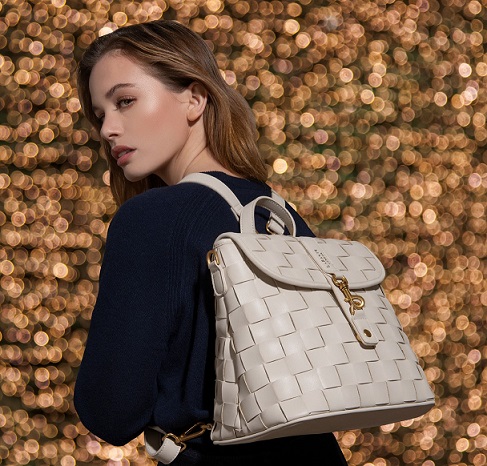You’re browsing the handbag section of your favourite vegan fashion brand. Already planning out your first outfit with the gorgeous faux leather clutch. Happy knowing that no animals were harmed in the making of this timeless piece. But is vegan leather always the more sustainable option? And are all alternatives created equal? We spoke to Vanita Badlani, founder of LaBante London, to find out.
Cruelty Free Beauty
- 4 signs you have low iron levels
- Zero Waste Beauty: Adopt a green routine with these sustainable products
- This eco-friendly beauty box is packed with refillable multi-taskers
- “I find myself using it even when I don’t need to!”
- Arctic-inspired natural skincare brand launches in the UK
- Green People launches beauty balm packaged in 100% biodegradable pot
- Lush launches same-day delivery service for its iconic handmade cosmetics
- “This cruelty-free tanning water gave me the confidence boost I needed”
- rho launches sustainable loungewear that gives back
- Rose & Caramel Raises Awareness For Women’s Self-Esteem & Mental Health With ‘I TAN FOR ME’ Campaign
- Couple launches entirely plant-based and refillable deodorant on Kickstarter
- View all
Eco Living
- Simple Hacks to Cut Your Food Waste with Gino D’Acampo
- Five Easy Ways to Reduce Food Waste
- Eat these foods to boost your mood
- Upgrade Your Cheese Toastie
- Have a healthy Christmas with these festive food swaps
- Omega-3 Health Benefits
- 5 minutes with Max La Manna
- A nutritionist’s guide to eating for healthy joints
- Easy ways to achieve your health goals
- Discover the benefits of raisins on a vegetarian diet
- Improve your gut health with California Raisins
- View all
Vegan Recipes
- Quorn Vegan Hot & Spicy Burger with Pink Slaw
- Tomato and Pumpkin Soup
- Pea and elderflower cocktail
- Matcha Coconut Ice Cream
- Vegan Lemon Bars
- Mango Salad with Thai Dressing
- Garden Gimlet
- Tofu & Green Beans Teriyaki
- Cornflakes Bombay
- Rainbow Pickle
- Soba noodles with kale and collards
- View all
Popular recipes
- Spinach and ricotta quiche vegetarian recipe
- Cheats mushroom and spinach lasagne vegetarian recipe
- Lentil bolognese vegetarian recipe
- Creamy mushroom stroganoff vegetarian recipe
- Malaysian Rendang curry vegetarian recipe
- Feta, Butternut Squash, Caramelised Onion and Cashew Nut Wellingtons
News
- Dutch Firm Unveils Vegan Egg White Substitute Made From Brewery Yeast
- BAM launches sustainable denim jeans for men and women
- Big Butterfly Count calls on public to help with conservation efforts
- EAT. has launched a vegan cheese toastie just in time for autumn
- New app helps you track and reduce your plastic consumption
- Sustainable beauty brand launches refillable hand sanitiser dispenser
- Eco shop launches curated box of sustainable beauty buys
- The Riverford Field Kitchen launches four-course veggie brunch
- PETA releases vegan guides to top holiday destinations
- Cruelty-free beauty platform launches virtual skincare consultations
- Love Food Give Food campaign calls on UK foodies
- View all
What is vegan leather and is it truly sustainable?
Everything you need to know about faux leather and choosing the most ethical alternative

Is vegan leather more sustainable?
When it comes to vegan leather, we may automatically assume that it’s a more ethical option. It’s certainly better for the animals, but what about the impact on people and the planet?
“Vegan alternatives will often be more sustainable, with one exception: PVC,” Vanita explains. “This is a material that is essentially plastic, and I personally think gives some vegan companies a bad name as it isn’t biodegradable. Apart from this though, vegan leather is usually made from recycled materials as well as a bit of resin for the coating.”

Greenhouse gases are becoming a major environmental issue, particularly owing to methane gasses emitted from livestock that are used in the food and leather industries. But, as Vanita says, the more companies that adopt greener practices and use vegan materials in their products, the more likely we can “tip the scales back in favour of the planet”. But keep in mind that as consumers, we also have a responsibility to ensure that the brands we purchase from are truly as environmentally friendly and socially responsible as they say they are.
“When looking for ethical brands, make sure that they purchase from other businesses with ethical practises,” Vanita says. “I personally think that greenwashing has become a big trend, and people need to be aware that it exists. ‘Greenwashing’ is defined by the Cambridge dictionary as ‘to make people believe that your company is doing more to protect the environment than it really is’. Unfortunately, today, loads of companies jump on the bandwagon touting sustainability and ethical practices. But in truth, a lot of the time, it is simply greenwashing.
“While the vegan companies don’t actively contribute to killing any animals, meaning they can be called more ethical than leather companies, truly ethical companies will also ensure that they go above and beyond to give back more than what they take from the planet, people and resources. As such ‘buyer beware’ consumers should take responsibility to check out the brands they are buying from.”
What is vegan leather made from?
As consumer and fashion lovers have become increasingly aware of the environmental and social impact of their purchases, we’ve seen an increase in global demand for vegan products. So the good news is that there are some great options on the market today that tick the sustainability boxes without compromising on quality.
“Apple leather and vegetable leather are the staple vegan alternatives, but now we also have pineapple leather, cactus leather and mushroom leather,” Vanita explains. “I believe one company has also managed to use coconuts to make leather, so there are quite a few options. LaBante has used vegetable and apple leathers, and we are confident about their durability, however even cactus leather has some great properties. So this is absolutely a growing industry, and more people are innovating to come up with such amazing solutions that animal skin could soon be obsolete!”

Different types of vegan leather
With so many more options on the market today, you’re probably wondering which type of vegan leather is best, and whether they’re all created equal. In most cases, the type of faux leather you opt for will depend on how you wish to use it, whether you’re looking for a vegan leather jacket or vegan leather bag.
Vegan leather is often more expensive, but don’t let that put you off. These materials are still relatively new, and the companies that are incorporating more ethical materials into their collections are working hard to ensure people have sustainable alternatives that will have a positive impact.
“The issue with most of these new innovations is that they are expensive,” Vanita says. “The price point really serves as a disadvantage to a brand like ours who works very hard to make sustainable fashion reasonable, because without that we won’t be able to achieve significant changes in buying habits. Luxury at an accessible price point: this is what we’re trying to achieve. As such, we’ve had to stay away from the more expensive ones like cactus leather.
Similarly, apple leather has a high price point and can often result in a higher wastage as it’s more difficult for craftsmen to work with, while mushroom and pineapple leathers have a texture that’s quite dissimilar to real leather, requiring a lot of research and experimentation from brands. But it’s all part of the future of the fashion industry: “I think it is important for innovation to continue and as more people adopt cruelty-free fashion the price points of these leathers will come down and then after a slow upward climb we will see rapid changes in consumer buying patterns to vegan sustainable fashion.”
How to choose vegan leather products
Whether you’re looking for the perfect pair of vegan leather boots or want a pair of vegan leather shoes that will never go out of style, here are Vanita’s top 5 tips to help you find pieces that are truly ethical:
Avoid PVC. There are many brands, including fast fashion companies, that use cheap materials like this, while claiming to sell a vegan product. While PVC is touted as vegan, it’s essentially plastic, so is incredibly harmful for the environment.
Look to purchase from a brand that sells only vegan products. These days, ‘vegan’ has become a buzzword, with everyone from cosmetic companies to mainstream leather brands billing certain items in their collection as vegan. This is often a marketing tactic to ensnare customers – usually, these companies wouldn’t be aware of the due diligence and process required to ensure that the product can be categorised as 100% vegan.
Read more about the brand to understand if it’s actually ethical. For example, what social causes does it support. What makes a brand truly vegan is if they are in fact empathetic to all beings, and actually do their part in promoting a greener planet. For example, LaBante tied up with Eden Forestation projects last month, and now every handbag purchased results in 10 trees being planted by us. That is our way of giving back to the planet.
Take care of your vegan leather like you would have done had you purchased a leather item. Whatever product you buy, it should be one that wears well over time, so ensure to keep it clean and safely wrapped in a dust bag when not in use, so that it can stand the test of time.
Wear it with pride! Tell your friends about your vegan leather accessories and products and let them know which brand you purchased it from. To make vegan fashion global, brands depend on their best brand ambassadors – you! – to talk about them and help to spread the word, so we can work towards a more sustainable future.
LaBante London’s Mae bag (image attached called PROMO 1) is featured as part of the Bags: Inside Out exhibition at London’s V&A for its use of sustainable materials. Check out the exhibition from 12th December 2020.




